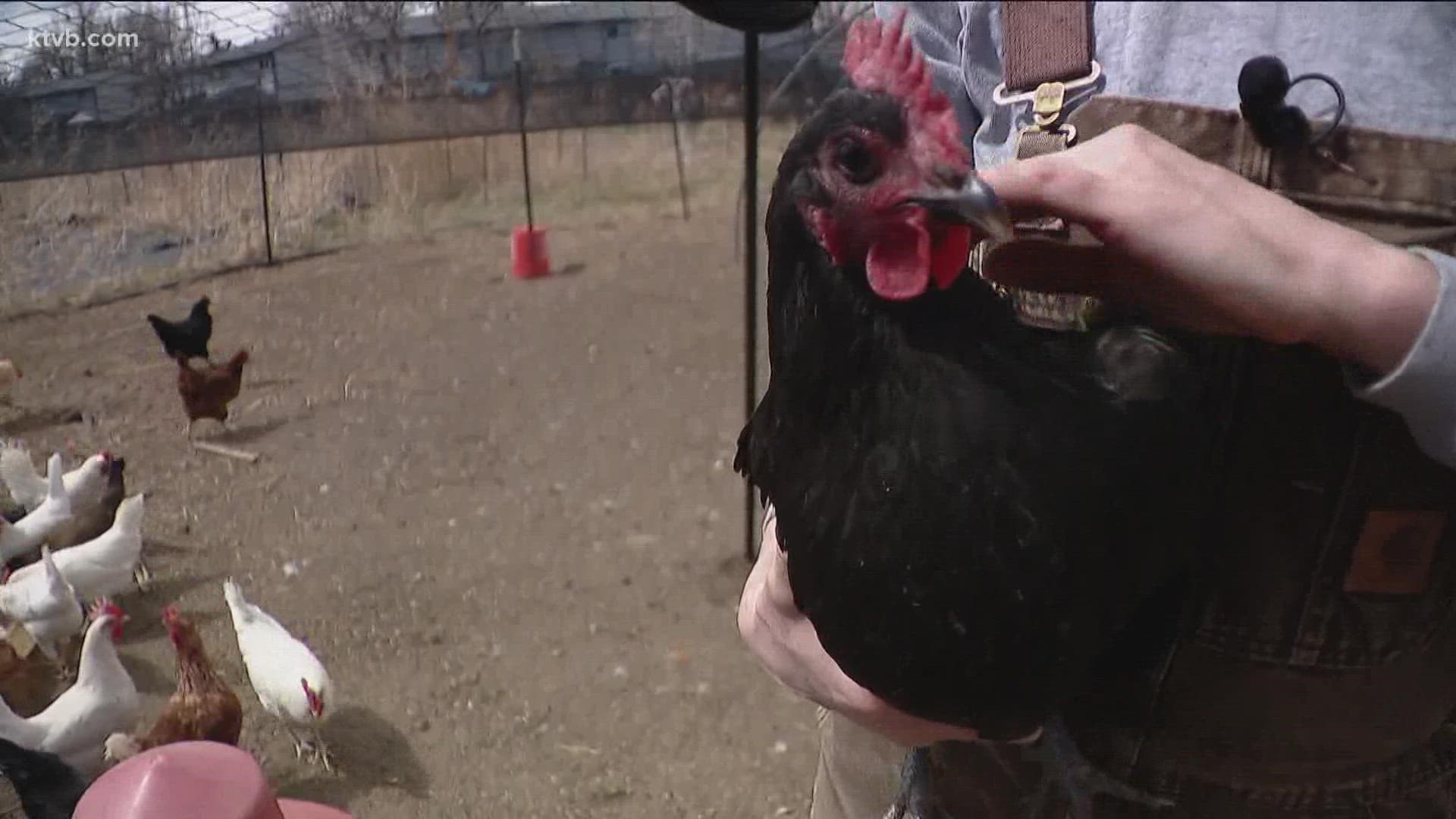BOISE, Idaho — After the Idaho State Department of Agriculture (ISDA) announced multiple cases of avian flu were found in the Gem State, health leaders and agriculture economists could see the potential of large impacts.
"The Highly Pathogenic Avian Influenza is extremely virulent, and in most cases, will kill any bird that acquires the virus," Idaho state veterinarian for ISDA, Dr. Scott Leibsle said.
ISDA reported Friday the virus has already killed two, separate flocks of chickens in Caribou and Gooding County. Leibsle said besides death, there are various symptoms of the avian flu to watch for.
"Because it's carried by migratory waterfowl, they don't necessarily show any symptoms and you can't tell if they're sick, but they can certainly pass the virus on to your domestic birds," Leibsle said.
It is unusual -- but possible -- to spread to humans, typically through direct contact with an infected bird. The illness can not be contracted through meat if it is cooked according to food safety standards.
With a loss in chicken and flocks, the price of eggs could continue to rise, agriculture economists warn.
University of Idaho Assistant Professor and Extension Specialist for Dairy and Livestock Economics, Hernan Tejeda, said high inflation and supply chain issues, mixed with the bird flu outbreak in the United States have, affected the wholesale and retail prices of eggs.
According to Tejeda, the average national price of a dozen eggs around the springtime was $1.60. At the beginning of April, the price had already increased to $2.50.
The avian flu has left an impact on the U.S. before. In 2015, a strain of the bird flu killed more than 50 million birds, according to the CDC. Eventually, livestock and supply returned to normal, but health leaders and economists are not sure when that may be.
"I don't think we're out of the woods," Tejeda said. "Wholesale prices have increased much more than the retail price. Given the avian flu has not been fully taken care of supply will continue to decrease and prices may stay high."
New reports say the current avian flu has already impacted 27 million birds.
Tejeda said his piece of advice for those looking to save money on eggs is to wait until it is at sale price. He said eggs have a certain shelf life and stores will occasionally bring down the retail price.
Owner of Jordan's Garden Center and Seasonal Market, Jordan Risch of Boise, is one of many dealing with supply chain-related issues.
"Because of the cost of food and the cost of fuel and everything, our overhead goes up and we need to adjust our prices accordingly," Risch said.
He added the current price of a dozen farm-fresh eggs is $3.75.
Risch -- who has been raising livestock for years -- told KTVB the avian flu is nothing new, but when new strains are detected, he tries to stay ahead of it.
"You want to make sure that your sanitary conditions are at the top of your priority," Risch said.
He owns about 25 chickens and expects to get a new flock next week, which he plans to quarantine.
"Keep them away from your herd or your flock for a few weeks until you're sure that they're healthy and they're not contagious before you mix them," Risch said.
With Easter right around the corner, egg sales at Jordan's Garden Center and Seasonal Market have been decent, according to Risch. He said people will go out of their way to drive to their business in Boise to buy farm-fresh eggs.
"The quality is beyond compare and that's why we do it," Risch said.
While Risch said he does not see the flu impacting his flock or prices, he believes prevention and safety measures are still key.
"[The livestock] look to us to take care of them," Risch said.
Leibsle's advice echoes Risch's. The state veterinarian said it is important for pet and livestock owners to keep any free-ranging birds confined, because it decreases their likeliness of interacting with wild birds that may have the flu.
The virus is carried by geese and ducks along their migratory path and is passed through close contact between birds. HPAI can be carried on tools, vehicles, clothing and boots, which can spread the illness from one location to another.
Limiting the number of people who interact with your flock, washing your hands before and after handling birds, and having dedicated clothing and tools for each flock can help prevent infection and the spread of bird flu.
Watch more Local News:
See the latest news from around the Treasure Valley and the Gem State in our YouTube playlist:

